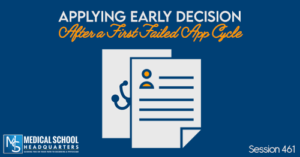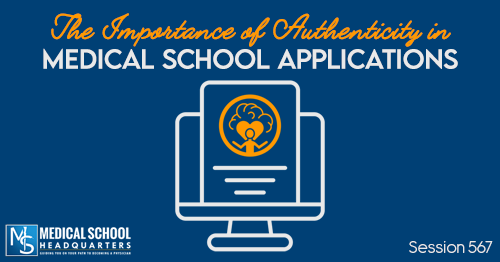Apple Podcasts | Google Podcasts
Session 461
Evan applied to medical school and had interviews, but didn’t get in. For his second cycle, he asked the right questions and decided to apply early decision. Today’s episode underlines the importance of not only asking the right questions and doing self-reflection, but also making sure that if at first you don’t succeed, you try again – properly.
For more podcast resources to help you with your medical school journey and beyond, check out Meded Media.
Listen to this podcast episode with the player above, or keep reading for the highlights and takeaway points.
[01:28] The MCAT Minute
The MCAT Minute is brought to you by Blueprint MCAT.
If you are planning on taking the MCAT in 2022 (January, March, April), the dates are out as of now go check them out on AAMC. The schedules have changed a little bit with no afternoon schedules for most of the sessions.
And don’t forget to check out the amazing free resources at Blueprint MCAT including their awesome new Spaced Repetition platform, with over 1600 expertly crafted flashcards available.
[02:46] Interest in Becoming a Physician
Evan played basketball in high school and ended up tearing his meniscus that needed surgery. This was what got him immersed in the field of healthcare, going through rehab with the physician, physical therapists, and athletic trainers.
It wasn’t until his junior year in college that he knew he wanted to be a physician. During one of his clinical rotations with women’s lacrosse, she saw a player that was in a similar situation where he had a bad knee injury in high school.
Seeing how the patient/doctor relationship played out, he became envious of the role of the physician. And at that moment, he knew it was what he wanted to do.
Evan studied athletic training and its curriculum was integrated with the core premed classes. So the only classes he had to take outside of the core curriculum was organic chemistry and biochemistry.
His school’s athletic training program also had a lot of clinical experience requirements so it was a good way for him to get some early hands-on clinical experience.
[06:43] Figuring Out How to Learn Best
Evan was initially concerned about his stats with his GPA not being stellar. He wasn’t sure if he was smart enough to get through med school but he just had to take the leap and he’s glad he did.
Not being able to develop good studying habits in undergrad, he got to a point where he was able to improve and take the time to reflect and figure out how he had to learn.
Evan realized he was more of a visual learner and so, he was able to refine his study habits and figure out how he learned best.
Ultimately, Evan ended up with an upward trend. He found out about the importance of the upward trend through listening to our podcasts as well as from his school advisor who helped him through the years.
'Your GPA is more than just the number, there's a story behind it.'Click To TweetAt the end of the day, what’s important is the story behind your GPA. And Evan learned that as long as you can articulate why the GPA is what it is and how you have grown from it then you’ll be alright.
[11:40] Telling His Story
Evan says he had a long journey and to condense everything into his personal statement was quite a bit of a challenge. But his advisor told him to just focus on one short paragraph. He was told to just explain what happened and what he learned from it. He also gleaned many ideas on how to properly write his personal statement from our podcasts.
[12:51] Not Getting an Acceptance the First Time
When Evan applied the first time, he got some interviews but didn’t get an acceptance. In hindsight, he thinks he could have done better in his interviews by doing more mock interviews and getting more feedback from people. The school that interviewed him that did an MMI gave him feedback that he could have explained his thought process well.
'Do many, many mock interviews because that's the best way to simulate what you're going to experience.'Click To TweetAnd so, he went through the first application cycle, and got a couple of wait lists and an outright rejection or nothing from the third school. Then comes the daunting task of reapplying to medical school. That being said, Even says he never even had a single thought to go back to athletic training.
He adds that you have to do what you’re passionate about no matter what profession you’re in. If you’re not passionate about what you’re doing then you’re not going to be happy at the end of the day. And for him, there’s nothing else he’s more passionate about other than medicine. Moving forward, Evan was committed to being focused on preparing for interviews.
[16:25] Thought Process on Applying Early Decision
Evan switched from applying to all the schools to applying early decision the second time around.
'If you're going to do early decision, there has to be a lot of reasons for you to do it, and no reasons for you to not do it.'Click To TweetFor Evan, he checked every box why he should do early decision. The school he applied to was his number one school from the previous cycle. And based on the feedback he got from them, he knew it wasn’t anything in his application that they weren’t happy about. . It was just his interview. And so, he didn’t want to wait all the way until then again, if he had to.
He also knew he wasn’t going to apply to as many schools as he did the previous cycle. And for him, it just makes sense for him to do early decision because he’s not seeing any downside to it.
He was also told by the school that they treat early decision applicants just like any other applicant, whether regular decision or not. So that was another thing that was huge for him knowing that there were some schools that will look at that if you’re early decision. They want you to have really high stats and really great clinical experience and be the “perfect applicant.” Good thing, the school told him they will look at him just like they did the previous cycle.
[19:57] Changes He Made for the 2nd Application Cycle
Evan says he didn’t change a ton, except that he rewrote his personal statement, moving paragraphs around and changing a few sentences. He also didn’t do a lot of updates because he was still doing the same activities he was doing from the previous cycle. And he didn’t have any coursework.
[20:39] The Waiting Time for Early Decision
Evan submitted in the middle of June to AMCAS. And if you do early decision, it basically bumps you to the front of the line. So he was actually processed the next day. He submitted his secondary by the last week of June though the first of July. He got his interview invite by the last week of July, got interviewed two weeks after that. And then another two weeks after, he got his acceptance call.
'If you do early decision, it basically bumps you to the front of the line.'Click To TweetSo no changing stats, no change in MCAT score – the biggest change was interview prep.
[22:31] His Interview Experience for the 2nd Cycle
Because it was MMI, they didn’t really have any background about him. And so, he just focused on the feedback he got from his last interview with regard to explaining his thought process. That means he had to put a why behind every answer he gave.
He explained why he was saying this and why he was thinking that. He basically let them know where his head was and what his thought process was.
In preparing for the interview, he used different resources including the MMI question generator. He also made flashcards with the questions and on the back of , what he would do exactly.
Finally getting the acceptance, Evan didn’t expect he’d be more emotional than he thought he was going to be. For him, it was a lot of weight lifted off his shoulders.
[26:55] Final Words of Wisdom
Evan emphasizes that it’s about your story. You’re more than just your numbers. He didn’t have a great GPA and he got some C’s in some science courses. He didn’t have a 90th percentile MCAT. But he did have a good story, which he was able to articulate. Tell them what makes you special and do whatever you can to highlight that as best you can because that’s what the schools want to know about.
'If you're afraid your stats aren't good enough, then focus on your story.”Click To TweetLastly, please check out The Premed Playbook: Guide to the Medical School Application Process, where I wrote a chapter in there about early decision. I typically consider it a risk for students.
But Evan did his homework. He realized that it’s going to be the same process in terms of early decision versus regular decision. And he was already offered an interview the first time around. He just needed to improve those interview skills, work those out and get that acceptance to medical school.
Links:
The Premed Playbook: Guide to the Medical School Application Process












